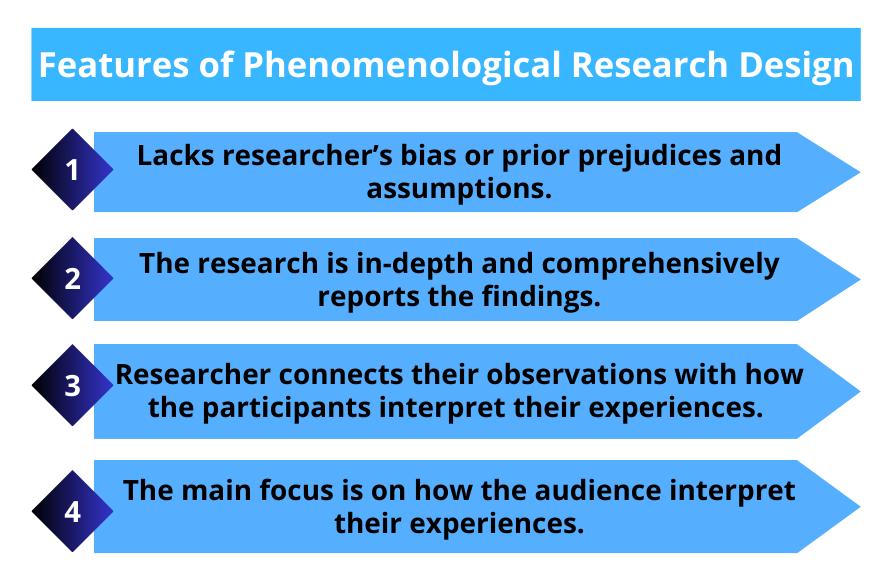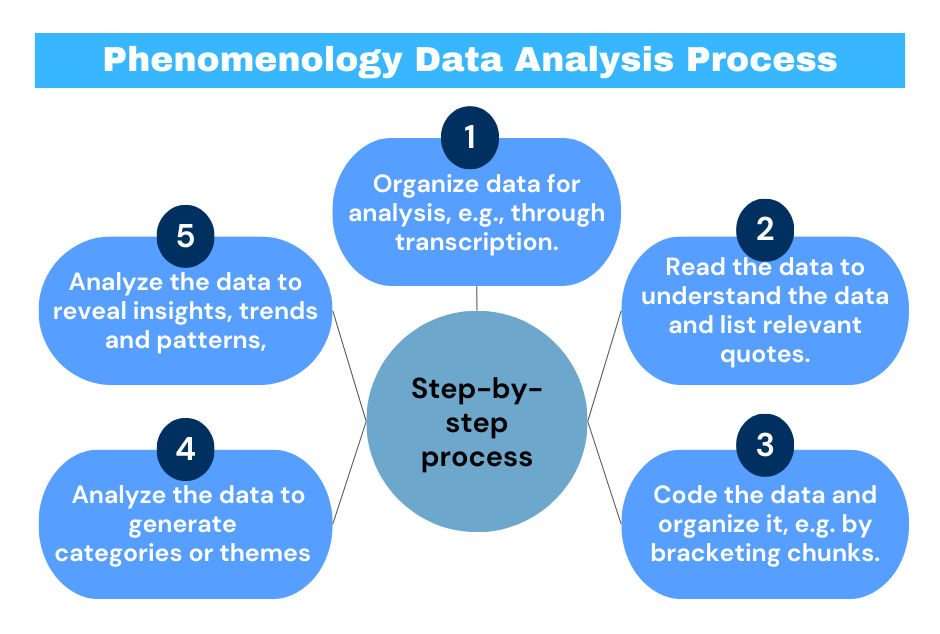Help to Write Phenomenology Research
If you are in the process of conducting a phenomenological study, you can obtain the best writing services from our experts. Phenomenology is a qualitative approach that researchers use to understand the nature of a phenomenon by exploring it from the first person point of view of those who have encountered it, how they have experienced it, and what it means in their subjective experience. The phenomenological study tries to identify a phenomenon as it introduces itself to the experience of the individual.
Through phenomenology, the researcher perceives and extracts information from the participant's motivations and behavior towards the given phenomenon. Phenomenological approaches are philosophically formulated, based on personal experience and rationality, to demonstrate the importance of personal perception and comprehension of a phenomenon. If you decide to use our services, you will obtain expert help in:
- Qualitative research design.
- Coding.
- Transcription of audio or video interviews.
- Data analysis using NVivo or manually.
- Write-up of the final manuscript.
- Editing and proofreading.
Types of Phenomenological Approaches
There are different kinds of phenomenological approaches each is rooted in a different philosophy.
1. Transcendental Constitutive Phenomenology
Transcendental phenomenology is also known as descriptive phenomenology. This type of phenomenology was defined by the philosopher Edmund Husserl in the early 20th century. Husserl suggests in his theory that phenomena should be the focus of study, as viewed by the consciousness of individuals. Therefore, according to Husserl's argument, phenomenology research should not be influenced by any assumptions: philosophical or scientific theory, inductive reasoning procedures, or any other philosophical theories rather, the emphasis should be on what was directly given to the experience of a person.
2. Existential Phenomenology
The existential phenomenology describes the subjective individual experience by displaying the beliefs, motives, ideals, intentions, emotions, and relationships of people. Existential phenomenology concerns itself with the individual's perceptions and behavior. Existential phenomenology is concerned with actual human behavior including the problems of personal decisions or behavior in life.
3. Hermeneutic Phenomenology
Hermeneutic phenomenology is also known as interpretive phenomenology, was drawn from martin Heidegger's work. The philosophical investigation of Martin began in line with the argument of Husserl, but later he questioned some points to the transcendental phenomenology of Husserl.
Heidegger believes that without referring to his/her past understandings, a person will not experience a phenomenon. Therefore, hermeneutic phenomenology attempts to explain deeper levels of human experience that are concealed beyond surface consciousness and the environment as it reflectively affects this experience. Hermeneutic phenomenology explores the concepts of living of an individual. This emphasis requires the researcher to analyze the perspectives given by research participants about their aspects. According to Heidegger, the researcher uses the knowledge gained during the research process to identify, examine and understand a phenomenon. The researcher can also use others' experiences to define and explain the phenomenon to obtain new knowledge
4. Realistic Phenomenology
Realistic phenomenology intensifies the quest for the common essences of various kinds of issues, including human behaviors and motivations. Realistic phenomenology is concerned with the concept of cognition and subjectivity. This means that they exist in the universe that is to a great extent external to consciousness rather than brought into consciousness.
5. Naturalistic Constitutive Phenomenology
Naturalistic phenomenology deals with how conscious awareness forms things in the natural world, assuming that conscious experience is part of nature. This method entails suspending the recognition of physical experience as something that occurs in the universe and is carried out to obtain an absolute subjectivity basis for the community.
Data Collection in Phenomenology
In phenomenological-based research, several tools may be used to collect data: interviews, participant observation, and personal text diaries analysis.
A. Interviews
This formal phenomenological approach to interviewing applies open-ended questions focused on concepts of contextual experience, recognizing and describing the phenomenon. A dialogue between the interviewer and the interviewee allows the comprehension of the phenomenon via language. Interviews can also be in form of focus groups whereby the researcher selects a small group of people to discuss a specific topic or issue to gain in-depth perspectives of the interviewees.
B. Observation
Observation is an indirect method of collecting experimental material from others. The best way to enter into a person's life world to observe their experiences is by participating in it. for instance, for children or the mentally handicapped, it is hard to generate material from their experiences through interviews, the best way is to play with them, walk with and participate in what they are doing. The researcher plays both a participant and observer roles.
C. Use of Diaries
The use of diaries for qualitative phenomenological research provides a contextual view into the experiences of a phenomenon as experienced by the writer of the diary. Diaries are used as a tool of data collection especially when Interpretive Phenomenological Analysis is employed. This method, most commonly used by psychologists, attempts to describe a group of people's structure and nature of the experiences.
Summary
Phenomenology is a qualitative method of research in which data the researcher explores the meaning of a phenomenon from an individual's perspective. The researcher seeks to understand the motive and actions of participants towards a given phenomenon. Phenomenological approaches are philosophically based: Transcendental constitutive phenomenology, existential phenomenology, hermeneutic phenomenology, realistic phenomenology, and naturalistic phenomenology. Phenomenological data is collected from personal diaries, observation, or phenomenological interviews.
Researchers should go through a sequence of processes to eradicate their own assumptions and prejudices, analyze the phenomenon without assumptions, and define the phenomenon's essential features based on actual themes that are identified. If you are in need of a phenomenology research writing experts, look no more! Our top-notch writing services company is well known for conducting qualitative research in fields such as healthcare, sociology, psychology, education, social sciences, among other for over 10 years. Join our live chat today for any inquiries on qualitative research and for an immediate response. We are available 24/7, hence you can contact us at any time of your convenience.







